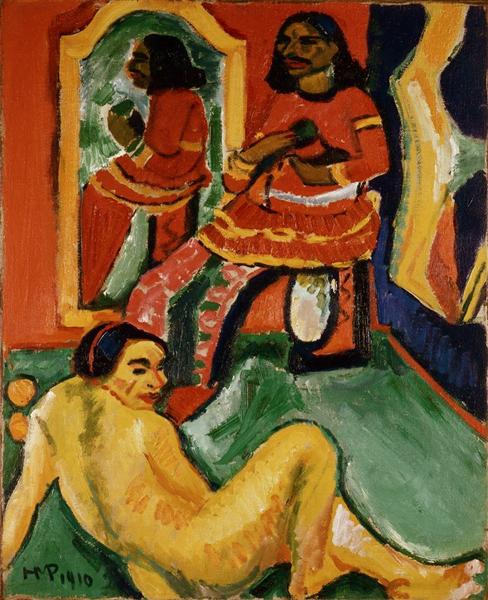Description
The work "Indian and Woman" (1910) by Max Pechstein is a remarkable example of German expressionism, a movement that sought to represent the vital experience through the distortion of color and shape. In this painting, Pechstein captures a deeply symbolic interaction between two central figures: an Indian, who emanates an aura of solemnity and connection with the earth, and a woman, who appears with an attitude of delivery and contemplation. The fusion of these characters suggests an intercultural dialogue, highlighting identity and belonging issues in the context of a Europe that, at the beginning of the 20th century, was in constant social and cultural transformation.
The composition of the work is characterized by a balanced disposition, where the figures are the center of attention, framed by a background of vibrant tones that contrast with the most dim palette of the characters. Pechstein uses color not only as an aesthetic medium, but as a vehicle of meaning; The nuances of blue, red and yellow create an almost primitive atmosphere that evokes spirituality and mysticism. This use of color is also a distinctive Pechstein style, which frequently moved away from naturalistic representation in favor of a more emotional and symbolic approach.
The faces of the characters are especially significant. The Indian is presented with marked features and an energetic expression, suggesting strength and wisdom, while the woman, with her intense and serene look, reflects a deep connection with nature and with the other. This duality in the representation of the characters one strong and the other gentle invites reflection on gender roles and interpersonal relationships. In addition, the clothing of both, which seems impregnated with symbolism, adds another layer of interpretation that relates to their respective cultures.
Pechstein, member of the expressionist group Die Brücke (El Puente), was always attracted to issues that explored the borders of modernity and tradition. "Indian and wife" is inscribed in this search for connection with the primitive, a cultural legacy that the artist often explored in his works. The work can be considered a mixture of styles, where aspects of indigenous art meet the pictorial language of expressionism, creating a piece that transcends time and cultural context, inviting an increasingly varied interpretation.
Pechstein's interest in the representation of non -European cultures was also linked to its commitment to art as a means to express the complexity of human experience. In a period marked by the beginnings of globalization and cultural interaction, "Indian and woman" can be seen as a reflection of the tensions and possibilities that arose at that time. This work resonates today through its themes of identity and otherness, which remain relevant in our contemporary world.
The expressionism of Pechstein, characterized by a visceral expressiveness and a bold use of color, establishes a strong legacy in the history of modern art. "Indian and woman" is not only a reflection of the technique and vision of its creator, but also a work that invites viewers to explore the convergence of various cultural influences, becoming a testimony of the rich upholstery of human experience of human experience and the search for meaning through art.
KUADROS ©, a famous paint on your wall.
Hand-made oil painting reproductions, with the quality of professional artists and the distinctive seal of KUADROS ©.
Art reproduction service with satisfaction guarantee. If you are not completely satisfied with the replica of your painting, we refund your money 100%.

